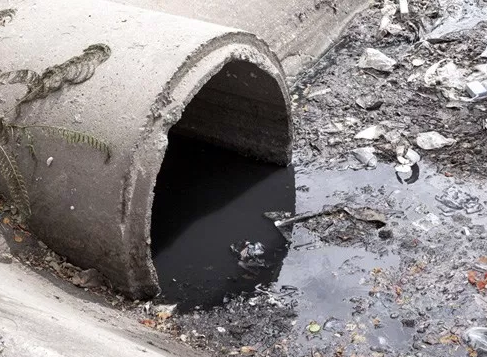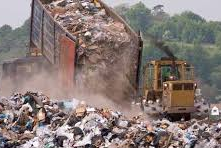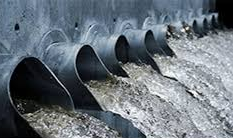Water pollution occurs when harmful substances often chemicals or microorganisms, which contaminate a stream, river, lake, ocean, aquifer, or other bodies of water, degrading water quality and rendering it toxic to humans or the environment.
Water bodies e.g. lake, river, ocean and ground water get contaminated due to discharge of pollutants in the water bodies. Water pollution adversely affects not only aquatic plants and animals but it also affects human beings and ecosystems.
Causes of Water Pollution
Water pollution is caused due to several reasons. Here are the few major causes of water pollution:
Sewage and Waste Water:

Rapid urbanization in India during the recent decades has given rise to a number of environmental problems. Many towns and cities which came upon the banks of rivers have not given a proper thought to the problem of wastewater, sewerage, etc.
The domestic sewage includes household wastes which pass through the municipal sewerage system. It includes food wastes, modern synthetic detergents used for washing clothes, cleaning bathrooms and latrines. Sewage, garbage and liquid waste of households, agricultural lands and factories are discharged into lakes and rivers. A part of it percolates into the ground and contaminates the groundwater. These wastes contain harmful chemicals and toxins which make the water poisonous for aquatic animals and plants.
Dumping:

Dumping of solid wastes and litters in water bodies causes huge problems. Litters include glass, plastic, aluminum, styrofoam etc. Different things take different amount of time to degrade in water. They affect aquatic plants and animals.
Lots of people dump household waste, construction debris into rivers or river banks. River dumping not only causes water pollution; it also harms wildlife and increases the risk of flooding. There is large volume of deliberate dumping of waste into coastal waters. Other sources of waste at sea include plastics and other materials blown or washed from land.
Industrial Waste:

Most Indian rivers and other sources of fresh water are polluted by industrial wastes or effluents. All these industrial wastes are toxic to life forms that consume this water. The significant contributors of wastewater are paper mills, steel plants, textile, tanneries and sugar industries. Industrial waste contains pollutants like asbestos, lead, mercury and petrochemicals which are extremely harmful to both people and environment. Industrial waste is discharged into lakes and rivers by using fresh water making the water contaminated.
Agricultural runoff:

Modern agricultural techniques require the use of fertilizers to improve the fertility of land and increase production. Traces of fertilizers and pesticides are wasted into the nearest water-bodies at the onset of the monsoons or whenever there are heavy showers. On entering the drinking water, these produce several health hazards.
Oil Pollution:

Seawater gets polluted due to oil spilled from ships and tankers while traveling. The spilled oil does not dissolve in water and forms a thick sludge polluting the water. Oil spillages affect water quality in a number of ways. Oil can make drinking water unsafe to drink. A substantial amount of oil released into oceans and seas will destroy wildlife and the ecosystems that sustain them. Oil spills also reduce oxygen supplies within the water environment. The main causes of oil-related water pollution are: loss from storage facilities; spillage during delivery and; deliberate disposal of waste oil to drainage systems
Acid Rain:

Acid rain is the pollution of water caused by air pollution. When acid rain reaches Earth, it flows across the surface in runoff water, enters water systems, and sinks into the soil. Acid rain has many ecological effects, especially on lakes, streams, wetlands, and other aquatic environments. Acid rain makes such waters more acidic, which results in more aluminum absorption from the soil, which is carried into lakes and streams. These pollutants make water toxic.
Global Warming:

Due to global warming, there is an increase in water temperature. An increase in water temperature can result in the death of many aquatic organisms and disrupt many marine habitats. For example, a rise in water temperatures causes coral bleaching of reefs around the world. This is when the coral expels the microorganisms of which it is dependent on. This can result in great damage to coral reefs and subsequently, all the marine life that depends on it.
Eutrophication:

Eutrophication is an enrichment of water by nutrient salts that causes structural changes to the ecosystem such as increased production of algae and aquatic plants, depletion of fish species, general deterioration of water quality and other effects that reduce and preclude use. It also depletes the oxygen in water, which negatively affects fish and other aquatic animal population.
Religious and Social Practices:

Religious faith and social practices add to pollution of our river waters. Carcasses of cattle and other animals are disposed in the rivers. Dead bodies are cremated on the river banks. Partially burnt bodies are also flung into the river. All this is done as a matter of religious faith and in keeping with ancient rituals. These practices pollute the river water and adversely affect the water quality.
Radioactive Substances:

Radioactive waste is another source of water pollution. Radioactive substances are used in nuclear power plants, industrial, medical and other scientific processes. They can be found in watches, luminous clocks, television sets, and x-ray machinery. There are also naturally occurring radioisotopes from organisms and within the environment. If not properly disposed of, radioactive waste can result in serious water pollution incidents.
Effects of Water Pollution:
Effects on Man:
Water polluted with domestic sewage can spread such epidemic diseases as hepatitis, cholera, typhoid, dysentery/diarrhea, and a number of other minor ailments and water borne diseases.
Effects on Vegetation:
Polluted water also affects crops and reduces the fertility of the soil. Polluted water may contain some pathogenic bacteria which cause many diseases in the cropland. It also results in destruction of many useful bacteria and other micro-organisms in soil thereby reduce its fertility.
Effects on Animals:
All organisms depend on surface water sources. Drinking water from polluted water-sources results in many diseases, especially in animals. The main problem caused by water pollution is that it kills organisms like aquatic plants, fishes, corals, etc. that depend on these water bodies.
Effects on Recreational Activities:
Polluted water also affects some recreational activities like boating, fishing, swimming and diving etc.
Effects on food-chains:
Pollution disrupts the natural food chain as well. Pollutants such as lead and cadmium are eaten by tiny animals. Later, these animals are consumed by fish and shellfish, and the food chain continues to be disrupted at all higher levels.
Destruction of ecosystems
Ecosystems can be severely changed or destroyed by water pollution. Many areas are now being affected by careless human pollution, and this pollution is coming back to hurt humans in many ways.
